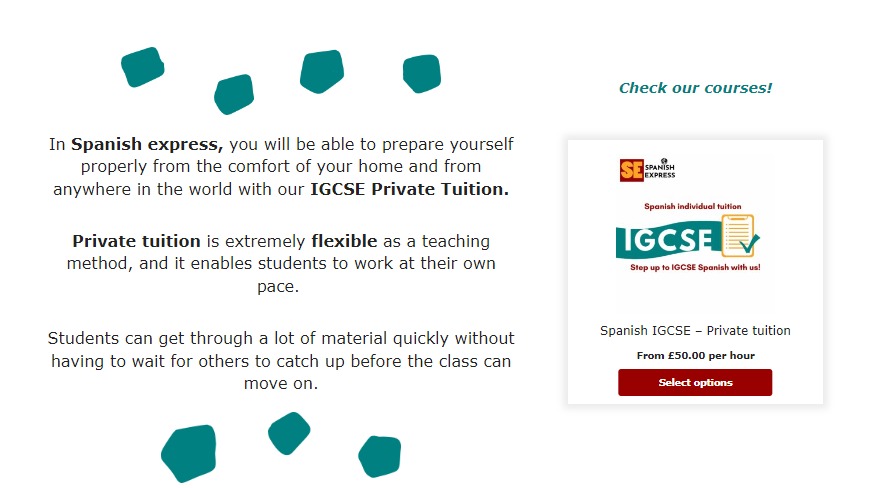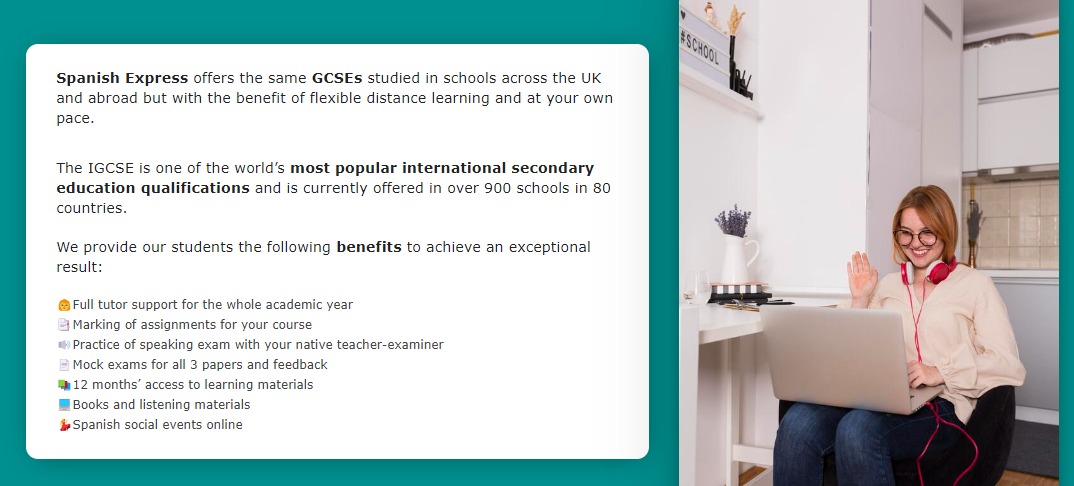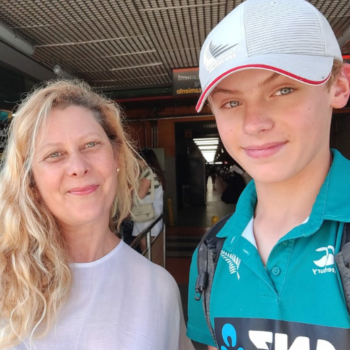

The Pearson Edexcel IGCSE Spanish is a dynamic course designed for learners aiming to boost their future through language skills.
It equips students with essential Spanish for academic and career advancement, mirroring real-world situations with authentic texts.
This engaging program covers speaking, listening, reading, and writing through three practical exams, fostering both formal and informal communication.
Perfect for classroom learning, it offers a clear, structured format and comprehensive support, preparing students for further education or training.
Join this course to start a linguistic journey that opens doors to new opportunities!
Topics and Subtopics
Topic A. Home and abroad
A1. Life in the town and rural life
A2. Holidays, tourist information and directions
A3. Services (e.g., bank, post office)*
A4. Customs and festivals
A5. Everyday life in a Spanish-speaking country, traditions and communities
Topic B. Education and employment
B1. School life and routine
B2. School rules and pressures
B3. School trips, events and exchanges
B4. Work, careers and volunteering
B5. Future plans
Topic C. Personal life and relationships
C1. House and home
C2. Daily routines and helping at home
C3. Role models*
C4. Relationships with family and friends
C5. Childhood*
Topic D. The world around us
D1. Environmental issues
D2. Weather and climate*
D3. Travel and Transport
D4. The media
D5. Information and communication technology
Topic E. Social activities, fitness and health
E1. Special occasions
E2. Hobbies, interests, sports and exercise
E3. Shopping and money matters
E4. Accidents, injuries, common ailments and health issues*
E5. Food and drink
*Sub-topics A3, C3, C5, D2 and E4 will not be assessed in Paper 3: Speaking
Three Papers
Paper 1: Listening
Students are required to convey their understanding of spoken Spanish through a series of listening tasks. Students must be able to:
- Identify and note main points.
- Deduce the meaning of words from context.
- Extract specific details • identify points of view.
- Show some understanding of unfamiliar language.
- Recognise attitudes, emotions and opinions.
This paper will feature questions drawn from a variety of sources, which all relate to the topics. These sources should be considered as different contexts in which students can write and understand Spanish. Specialist and/or technical Spanish vocabulary or detailed specialist knowledge of the topics are not required.
The listening examination lasts 30 minutes and is worth a quarter (25%) of the qualification. It consists of 40 marks. This paper will consist of seven tasks, each based on a single recorded text. Students will be given five minutes to read the questions before the paper begins and will be expected to respond to the questions as they listen. Students will hear each text twice.
Paper 2: Reading and Writing
Students are required to convey their understanding of written Spanish through a series of reading tasks. Students must be able to:
- Identify and note main points
- Deduce the meaning of words from context
- Extract specific details • identify points of view
- Show some understanding of unfamiliar language
- Recognise attitudes, emotions, and opinions.
This section will feature questions drawn from a variety of sources that all relate to the topics. These sources should be considered as different contexts in which students can write and understand Spanish. Specialist and/or technical Spanish vocabulary or detailed specialist knowledge of the topics are not required.
Students need to draw on their knowledge of the Spanish language, grammar and lexis in selecting appropriate forms of words to complete sentences and demonstrate an ability to manipulate Spanish language in continuous writing. As part of their International GCSE, students should undertake regular writing activities.
Reading: Students should spend approximately 52 minutes of the 1-hour and 45-minute exam on this section, which is worth 50% of the paper and 25% of the qualification. It consists of 40 marks.
Writing: Students should spend approximately 52 minutes of the 1-hour and 45-minute exam on this section, which is worth 50% of the paper and 25% of the qualification. It consists of 40 marks.
Paper 3: Speaking
Students are required to convey their understanding of spoken Spanish through three speaking tasks. Students must be able to:
- Describe the contents of a picture
- Describe possible past or future events related to people in the picture
- Respond to questions about the picture and its related topic
- Take part in a spontaneous conversation on two further topics. In each conversation, students must develop their responses, show initiative, express and justify points of view and refer to past, present and future events.
The examination is made up of three tasks (A, B, and C).
Task A (picture-based discussion) The intention of this task is to enable students to speak about a situation or scenario with which they have some familiarity. Students will have to select a picture before the exam. Students will select a picture from any sub-topic area, excluding sub-topics A3, C3, C5, D2 and E4. These will not be assessed in Task A.
Tasks B and C (conversations on topics) The intention of Tasks B and C is to test students on two topics that have not been specifically prepared so as to test the spontaneity of response. The teacher/examiner uses the randomisation grid provided by Pearson to determine which topic is to be examined in Tasks B and C. Sub-topics A3, C3, C5, D2, and E4 will not be assessed in Tasks B and C.
Assessment objectives and weightings
In the Pearson Edexcel IGCSE Spanish exam, your abilities in speaking, listening, reading, and writing are tested and weighted to reflect their importance in real-world Spanish use.
Each skill contributes to your overall score, aiming to prepare you for future studies or career opportunities where Spanish is beneficial.
Relationship of assessment objectives to papers
For the Spanish exam, there are three main tests: listening, reading and writing, and speaking. Each test checks different skills.
The listening test shows how well you understand spoken Spanish. The reading and writing test looks at how you understand written Spanish and how you write it yourself.
The speaking test checks how good you are at talking in Spanish. All these parts work together to show how well you know Spanish.
Pearson Edexcel International GCSE Speaking Exam
The Pearson Edexcel International GCSE Spanish Speaking Exam will take place in April and May each year.
Teachers or the school/college will determine the specific date for each student’s speaking test during these two months. Be sure to confirm your exam dates with your school/college.
How can Spanish Express help you with your Spanish International GCSE?
Spanish Express has a wide range of courses and programs to help you prepare for your exams 😉.
For personalized, goal-focused tutoring, have a look at our Spanish International GCSE Online Programme. 🎬 It’s a private one-on-one tuition by accredited Spanish teachers who have many years of experience in their subjects.
There are numerous students who have prepared for their Spanish IGCSE exam through online tuition plus 1-4 week immersion program. They basically started taking online lessons to culminate their journey with us.
With the Spanish Homestay Immersion Programme (SHIP) you can travel to Spain and learn at home with our teachers. 😀
Immerse yourself in Spanish culture! 🇪🇸
It’s a way to learn Spanish while living a unique and unforgettable experience. ✈️
Let’s study Spanish together!
What is Edexcel GCSE Spanish out of?
Edexcel GCSE Spanish tests you on reading, writing, speaking, and listening. The total score you can get is 100%.
What is the difference between AQA and Edexcel Spanish GCSE?
AQA and Edexcel Spanish GCSE are both exams for students to show their Spanish skills. The main difference is in how they set up the exam and what they ask you to do. For example, some topics or the way you need to write or speak might be different. Both have their way of checking your Spanish knowledge.
How hard is GCSE Spanish?
GCSE Spanish can be tough. It depends on how well you know Spanish before you start and how much effort you put into learning it. With good teaching and support, and if you keep practicing and making progress, you can do well. It’s about how much you’re ready to learn and use the language.
After getting GCSE Spanish you can easily explore a multitude of job opportunities tailored for Spanish speakers on Jooble, providing a diverse array of career paths to match your language skills and expertise.









